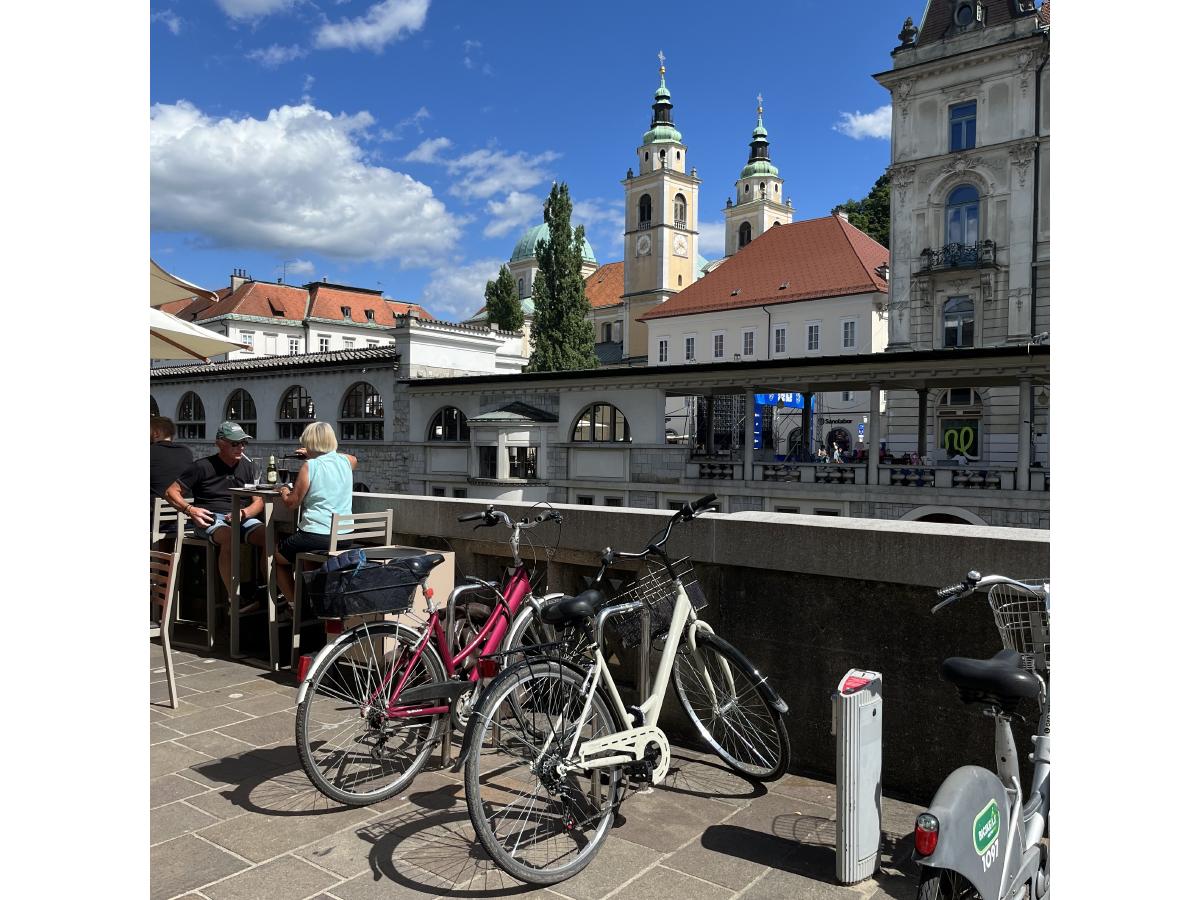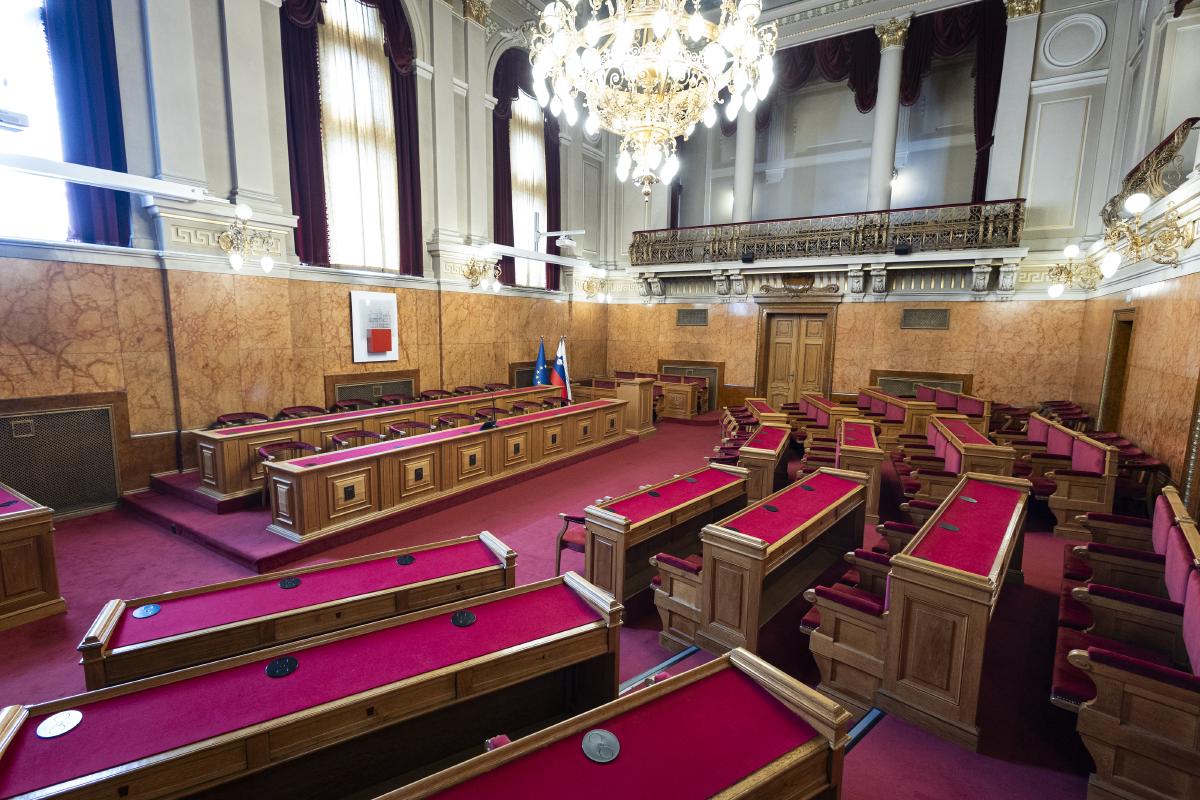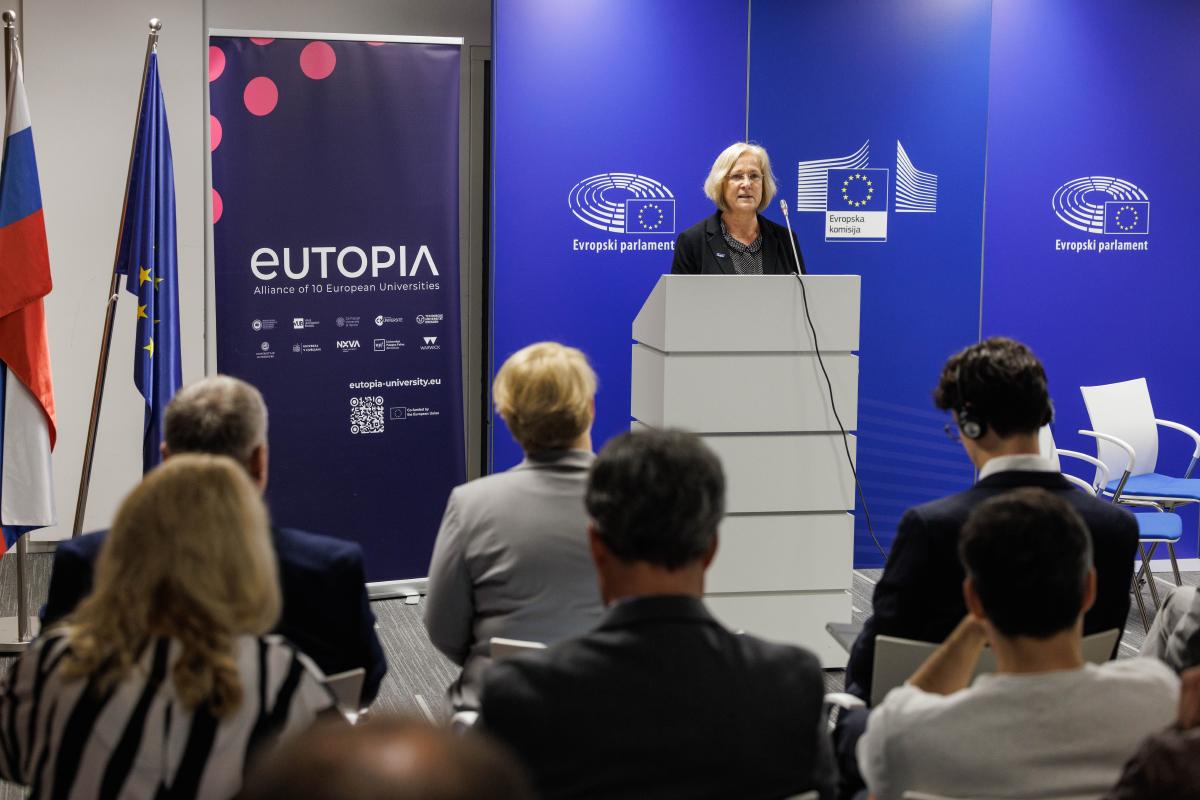You are here :
- EUTOPIA website
- Home
- About us
- Information
- Members
University of the month: University of Ljubljana
Short introduction
University of Ljubljana (UL) was founded in 1919, with 23 faculties and 3 art academies. It is Slovenia’s oldest and largest higher education, scientific research, and art institution. The university fosters basic, applied, and developmental research.
UL ranks among the top 5 % of universities in the world. Their degree programmes range across all fields of study: Art, Fine Arts, Natural Science, Technology and Engineering, Social Sciences, Humanities, Medicine, Health Sciences, and Sports, all designed in line with the Bologna Process guidelines.
Each year, around 40,000 students increase and develop their knowledge and skills at our institution, including more than 9% of the student body comprised of international students from more than 100 countries.
In cooperation with foreign universities, they conduct interdisciplinary and multidisciplinary studies and emphasise international exchanges of students and staff. They are actively involved in international partnerships and are a member of EUTOPIA.
“Every day, we pursue the University of Ljubljana’s vision of becoming an increasingly recognisable, internationally open and excellent research university that continuously and creatively contributes to raising the quality of life.”
UL in a few words
University of Ljubljana (UL) is the oldest, largest, and internationally best-ranked university in Slovenia, being among the top 500 universities according to the Academic Ranking of World Universities Shanghai ranking (ARWU). The university was founded in 1919 and encompasses 23 faculties, 3 art academies, and 3 associated members. It covers all scientific fields – natural sciences, engineering, social studies, humanities and arts.
In terms of the number of students, UL ranks among the largest HEI in Europe, with more than 37.000 undergraduate and postgraduate students. In terms of the number of employees, UL ranks as a medium-sized HEI and employs more than 6.600 employees, including around 3.500 academic staff.
UL is renowned for its quality social and natural sciences and technical study programmes, structured in accordance with the Bologna Declaration. Study programmes at UL cover all ISCED areas in the first and second-cycle study programmes and lead the way in some new developments in technology and research (cognitive science, nanotechnologies, environmental sciences, biomedicine, etc.).
UL is very active in national and international R&D and educational programmes, creating almost half of Slovenia’s research results. In 2023, UL researchers worked in 269 research groups on 186 national research programmes and 365 national research projects with more than 4.626 registered researchers.
UL strives to integrate sustainability in its various activities and processes. Moreover, it also regularly participates in new research and development projects aimed at the sustainable transformation of higher education through the partnership networks in which it operates.

Our campus
Slovenia, officially the Republic of Slovenia, is a state in Central Europe at the crossroads of main European cultural and trade routes. It is a full member of the European Union since 2004. It borders Italy to the west, Austria to the north, Croatia to the south and southeast and Hungary to the northeast.
Since its foundation in 1919, the University of Ljubljana has been housed in a country mansion on Congress Square in the city centre of Ljubljana. The main building, the academies and many faculties are located in the city centre. The newer university buildings are located on the outskirts of Ljubljana, giving the university and its students an old-world feel in the city.
The university encompasses 23 faculties, 3 art academies, and 3 associated members. It covers all scientific fields – natural sciences, engineering, social studies, humanities and arts.
UL builds and strengthens the academic union of professors, researchers, students and other associates and aims at the university enforcement at home and in the world. The research, education, professional and public activities, as well as the relations between the community members, are based on the:
- academic excellence and the highest possible quality,
- academic freedom of the academic and other staff and students, especially the freedom of creativity,
- autonomy in relation to the state, political parties, corporations and religious communities,
- humanism and human rights, including equal possibilities and solidarity,
- ethical and responsible attitude towards the world.
UL unites 26 faculties/academies (three art academies and 23 faculties) and five associate members (the National and University Library, the Central Technical Library of the University of Ljubljana, the Innovation and Development Institute of the University of Ljubljana, the National Institute of Biology and the Ljubljana Student Centre).
- Enrolled at UL: 37.402 students
- UL employs 6.891 teachers, researchers, assistant professors, professional and administrative staff
- UL ranks among 600 and 700 of the best universities in the world (Shanghai Ranking)
The University of Ljubljana provides infrastructural support via the infrastructure programme of the University of Ljubljana »Network of Research and Infrastructural Centers UL (MRIC UL)«, which includes 33 infrastructural centres within 14 member faculties of UL. The infrastructure program plays an important role in supporting member faculties’ participation in international infrastructure projects of the European Strategy Forum on Research Infrastructures (ESFRI). The participation is implemented via member faculties’ infrastructure centres: Faculty of Social Sciences (CESDA and PLMER), Faculty of Pharmacy (EATRIS), Faculty of Medicine (ELIXIR and SiMBioN), and Faculty of Chemistry and Chemical Technology (E-RIHS) and other faculties.
UL is also very active in international research and education programmes. In the programming period 2014-2020, the UL altogether cooperated in approx. 980 European projects, including 195 H2020 projects, ranked UL first among the research organisations in the EU-13 countries. In 2023, UL was involved in 643 ongoing European projects. Up to the end of the year 2023, UL has been involved in 82 HORIZON 2020 and 140 HORIZON EUROPE projects (including 15 ERC grants, 3 Twinning projects and 47 Marie Skłodowska-Curie Actions), and 16 projects of the European territorial cooperation programme, among others. UL is currently involved in 676 active projects ranging from EU programs to international collaboration, like NIH, AFOSR and others. Within active projects, UL researchers are coordinating 110 projects from Erasmus+ to Horizon.
To protect the university’s intellectual property developed through publicly financed research projects and to improve the technology transfer from the university to the industry, a central university Technology Transfer Office was established in 2007. The university develops and accelerates research through the University Committee for R&D and Committee for Innovation, which comprises representatives from the most propulsive faculties. University Incubator and Institute for Innovation and Development and the Slovenian Innovation Hub are three other units in which the University of Ljubljana supports innovation and development in different ways, along with laboratories and other research units within Faculties.
Since 2008, UL has been committed to respecting the principles of the European Charter for Researchers and the Code of Conduct for Recruitment of Researchers, which led to the “HR Excellence in Research” award in 2013.
Information on projects in 2023
- 643 EU projects
- 186 research programmes
- 985 projects with industry or knowledge users (Slovenia and abroad)

Internationalisation and alliences
The University of Ljubljana’s international role is extremely important on the national and regional levels, where internationalisation is a significant factor of openness in the learning and work process, which is undoubtedly enhanced by the visiting teaching staff and international students.
We have a strong record, particularly in exchanges under the Erasmus+ programme with programme and partner countries, CEEPUS (Central European Exchange Programme) and exchanges based on bilateral agreements and individual exchanges. Adding to the number of exchange students are those going on work internship exchanges and those taking part in summer schools. The university is also actively involved in the organisation of short intensive programmes and in the development of international joint programmes.
UL has an active membership in different networks, such as EUTOPIA University Alliance, the Guild, CELSA, LERU-CE7, UNICA, Utrecht Network, European University Association (EUA), CEEPUS, previously mentioned Central European Exchange Program, CEI University network, SAR Scholars at Risk and Rector’s Conference Alpe Jadran.
The University of Ljubljana (UL) has been participating in the Erasmus + program since 1989. It consistently follows the principles set out in the ECHE Charter and carries out the activities required before, during and after the mobility. In Key Action 1, which refers to individuals’ learning mobility, UL implements students’ mobility for study and traineeship and teaching and training staff mobility.
For the successful implementation of the Erasmus + program, more than 2000 interinstitutional agreements have been reached, with around 900 higher education institutions participating in the program. Lists of agreements, information on partners, study programs and conditions of participation are published on the website. In order to increase transparency and manageability, UL has signed interinstitutional agreements at the Member State level, which has enabled it to adapt more quickly to real needs and to communicate appropriately with partners. UL and its members implement the Internationalization Strategy, which has been incorporated into faculty strategies through the conclusion of agreements. The University Office for International Cooperation (USMS) supports their activities and coordinates activities that are in the common interest of all participants. It implements and monitors the financial part of mobility, maintains a database and coordinates and implements the contractual part of the project. UL carries out approximately 1500 outgoing students in each contract cycle and accepts the same number of incoming students. It carries out almost 200 staff mobility for teaching and 100 mobility for training.
Most Slovenian students carry out mobility in Germany, Portugal, Spain and the Czech Republic. UL hosted the largest number of German, Spanish, French and Czech students. All UL members participate in the Erasmus + program, the most active are members with several subjects and programs in English and a clear vision of internationalisation.
Equality and inclusion
The University of Ljubljana is committed to strengthening policies and actions to ensure an open, tolerant and safe academic environment where diversity is expressed and the potential of each individual is nurtured. This commitment is reflected in the following key documents and activities.
The principles of equality and inclusion determine the university’s view of tomorrow and its intergenerational concern for a sustainable future. Equality and inclusion are and must be indispensable chapters of higher education development guidelines and an article of the contract that the university concludes with the social environment.
We regularly promote tutoring for students with special needs and special status, train student tutors, strengthen the institute of self-advocacy for students with special needs and special status, actively participate in the processes of legislative changes affecting the equality of male and female students, inform, sensitise and guide for the empowerment of vulnerable and neglected persons in our environment. As part of the Srčna UL campaign, we strengthen solidarity, empathetic response to distress and a sense of community. We draw attention to the values of humanity, humanism and collective action for the benefit of our and future generations. We promote the understanding that a public university educates the public and contributes to the common good and quality of life.
Number of UL members certified as offering “Athlete-Friendly Education”: 11
Certificate awarded by the Olympic Committee of Slovenia, Association of Sports.
Number of UL members with the “Dementia-Friendly Point” certificate: 2
School of Economics and Business, Faculty of Social Work (certificate awarded by the Spominčica association).
Number of UL members awarded the “LGBT-Friendly Environment” certificate: 3
The certificate was awarded to the UL Rectorate in 2022 by the Municipality of Ljubljana. In 2017, it was awarded to the Faculty of Mathematics and Physics and in 2019 to the Faculty of Social Work.
UL has also joined the process of obtaining the DGNB Sustainable Building Certificate in cooperation with the Faculty of Medicine and the Veterinary Faculty.

Sustainable development
At the UL, we recognise the important role that universities play and will continue to play in the development and dissemination of knowledge in the field of sustainability, thus fostering a deeper understanding of the need for a transformation towards a sustainable society. They represent and create a space for critical reflection on societal challenges and bring together researchers, innovators, students, employers, policymakers and local communities.
Our activities in this area, therefore, include:
- Engaging in critical reflection on the challenges and their complexity in the context of sustainable transformation.
- Fostering social dialogue on the challenges related to sustainable development.
- Monitoring and expanding our own behaviour and influence on systemic and behavioural changes that support sustainable transformation.


